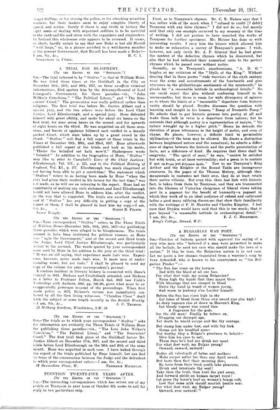A TRIAL FOR BLASPHEMY.
ITO THE EDITOR or THE SPECTATOR.") Sin,—The trial referred to by " Stultus" is that of William Hone. He was tried three times at the Guildhall in the City on December 18th, 19111, and 20th, 1817, on three ex-officio criminal informations, filed against him by the Attorney-General of Lord Liverpool's Government, for three parodies—viz., "John Wilkes's Catechism," " The Political Litany," atul " The Sine- suriats' Creed." The prosecution was really political rather than religious. The first trial was before Mr. Justice Abbott and a special jury, and the two others were before the Lord Chief Justice, Lord Ellenborough, and a special jury. Hone defended himself with great ability, and spoke for about six hours on the first trial, for neer seven hours on the second, and for upwards of eight hours on the third. He was acquitted on all three coma- sione, and bursts of applause followed each verdict in a densely packed Court, which were taken up by a great crowd In the street. " Stultus " will find a full report of these trials in the Times of December 19th, 20th, and 22nd, 1817. Hone afterwards published a full report of the trials, and took SS his motto, " Thrice the brindled cat bath mew d." Shakespeare wrote " brinded." Iu addition to the biographies of Hone, " Stultus" may like to refer to Campbell's Lives of the Chief Justices: Ellenborough, Vol. III., p. 223, and to the Political History of Ragland, Vol. XI., p. 177. Ellenborough was much chagrined at not having been able to get a conviction] The statement which " Stultus" refers to as having been made by Hone "when the jury had given their verdict in his favour for the last time," was not made, as he will eee on referring to the report. Hone had no opportunity of making any such statement, and Lord Ellenborough could not have allowed Hone to address him, after the verdict, in the way that is suggested. The trials are excellent reading, and if " Stultus " has any difficulty in getting a copy of the sport of them, I shell be pleased to lend him my copy.—I am,


































 Previous page
Previous page